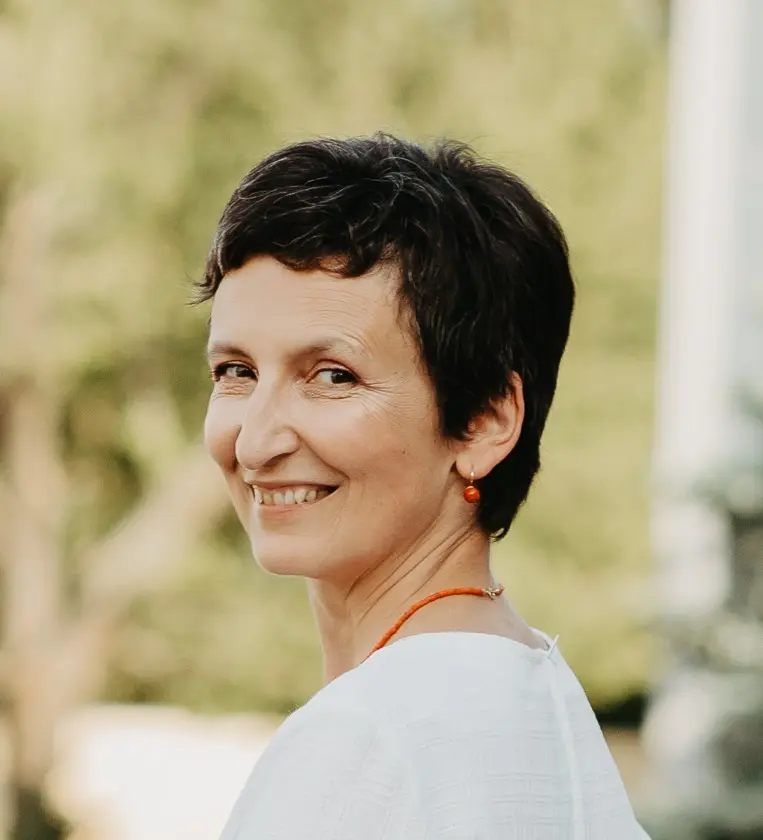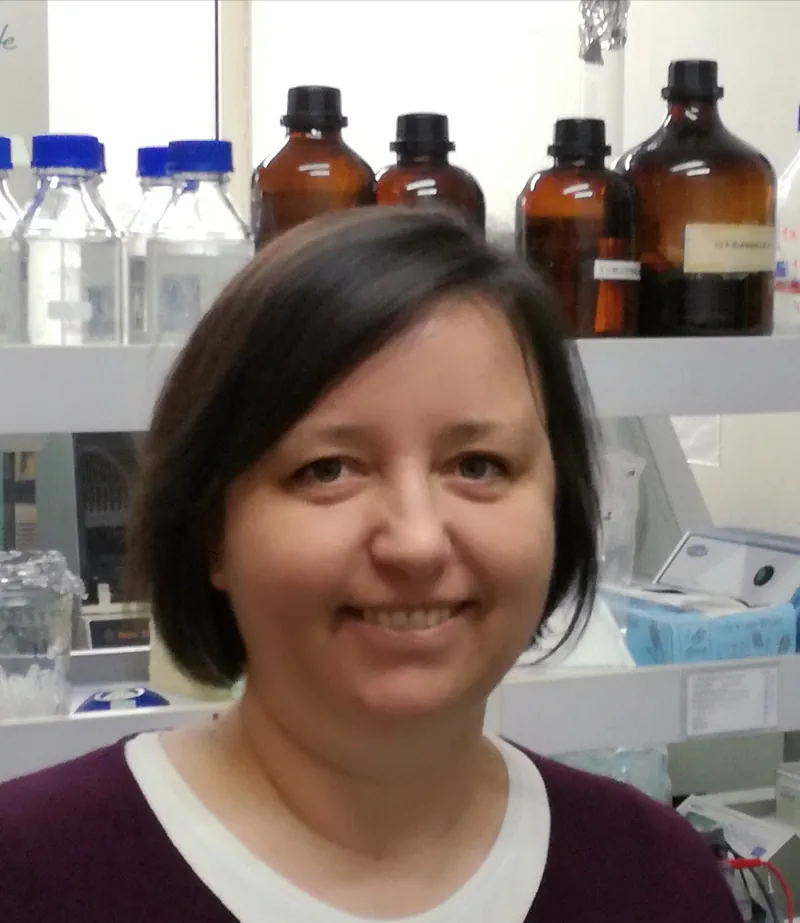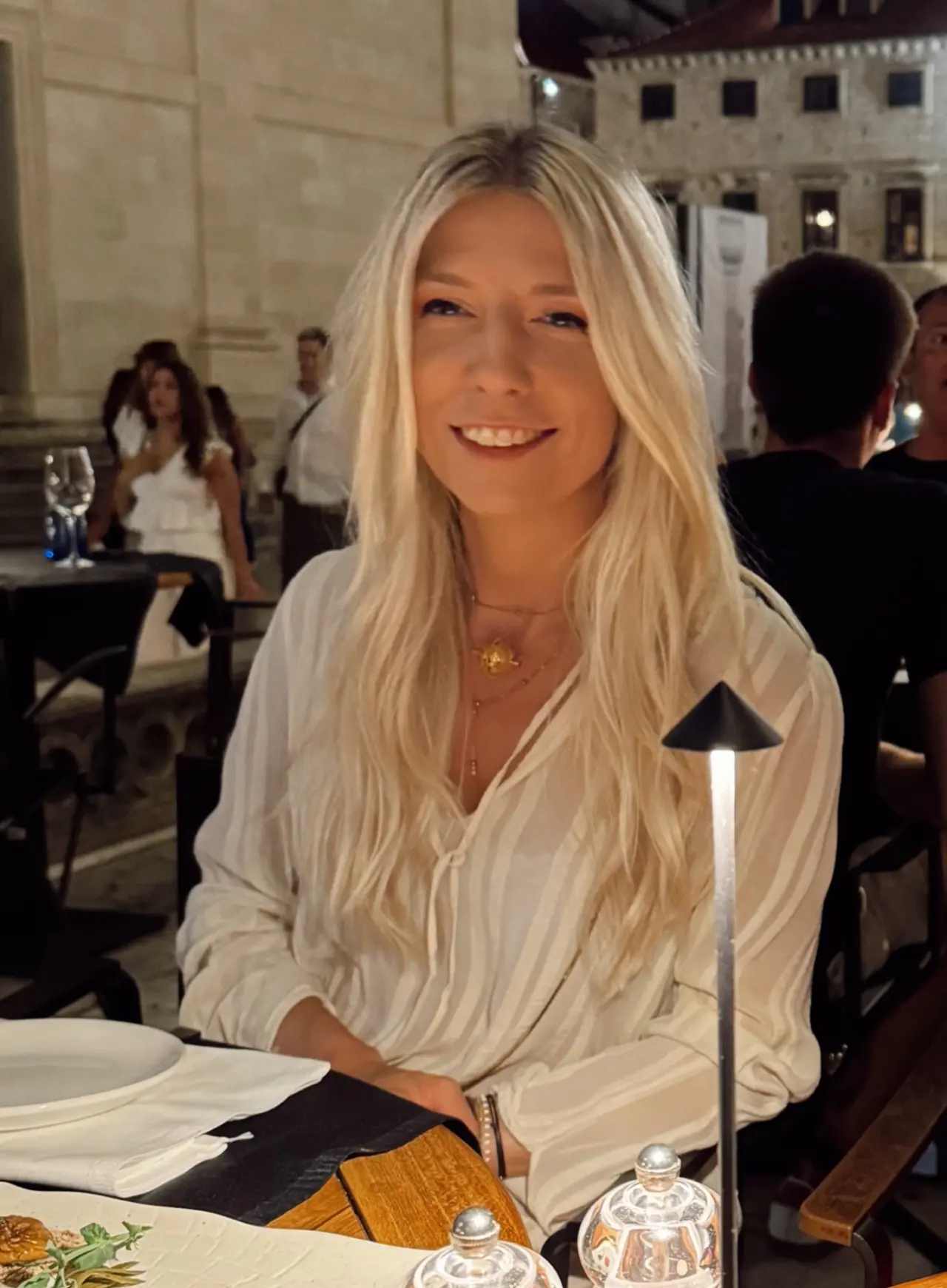Our researchers - knowledge, experience and innovation in the service of science and society.

Scientific advisor in permanent position

Scientific advisor in permanent position

Senior Research Associate

Senior Research Associate

Research associate

Research associate

Research associate

Research associate

Research associate

Expert advisor

Assistant

Assistant

Senior technician

Technician

Senior Advisor
To provide the best experiences, we use technologies like cookies to store and/or access device information. Consenting to these technologies will allow us to process data such as browsing behavior or unique IDs on this site. Not consenting or withdrawing consent, may adversely affect certain features and functions.

Dr.sc. Beata Halassy is a permanent scientific advisor, serving as the head of the research team and laboratory at the Center for Research and Knowledge Transfer in Biotechnology, University of Zagreb. She received her complete formal education at the Faculty of Science and Mathematics, University of Zagreb (1994 B.Sc. in Molecular Biology, 1998 M.Sc., and 2003 Ph.D. in Biological Sciences). She spent the first 19 years of her career in the Research and Development Department of a pharmaceutical company specializing in the production of vaccines and drugs from human and animal blood (Immunološki zavod dd), which shaped her research interests. The projects she leads are, generally speaking, focused on understanding the immunogenicity of complex antigens, such as animal and human viruses or snake venoms, and on the development of passive antibody therapy for viral diseases, i.e. snakebite poisoning (v. antivenoms). Her innovation in the upstream part of the production of antivenom is protected by the trade secret of the former company, and the invention in the field of virus purification, applicable in the downstream part of the production of viral preparations, is protected by recognized European and American patents. During the COVID-19 pandemic, she led a national project focused on the development and introduction of serotherapy for that disease in our country, which she successfully did with her team. The latest scientific interest is the use of the power of viruses in the fight against cancer, and on this topic he is currently (2024-2027) leading 3 complementary projects, with a total value of 1.6 million EUR. She has published 77 scientific papers in international scientific journals, her work has been cited over 1000 times, and the H-index is 20 (according to Web of Science 2025/08). Bibliographic data are available at this one and this one links.
Dr.sc. Dubravko Forčić is a permanent scientific advisor at the Center for Research and Knowledge Transfer in Biotechnology, University of Zagreb. He received his complete formal education at the Faculty of Science and Mathematics, University of Zagreb (1991 B.Sc. in Molecular Biology, 1995 M.Sc., and 2001 Ph.D. in Biological Sciences). He spent the first 22 years of his career in the Research and Development Department of a pharmaceutical company specializing in the production of vaccines and drugs from human and animal blood (Immunološki zavod dd). His scientific fields of interest are: molecular epidemiology and molecular biology of negative single-stranded RNA viruses; molecular markers of attenuation of negative single-stranded RNA viruses; immunity to negative single-stranded RNA viruses; vaccines; separation, purification, and characterization of biologically active macromolecules. He has published 75 scientific papers in international scientific journals, his work has been cited over 800 times, and his H-index is 19 (according to Web of Science 2025/08).
Tihana Kurtović received her entire formal education at the Faculty of Science and Mathematics, University of Zagreb (B.Sc. in Biology 2007, Ph.D. in Natural Sciences 2013). At the time of writing her doctoral dissertation, she was employed as a research assistant in the Department of Research and Development of the Institute of Immunology, Inc. in Zagreb. During that period, she gained experience in the field of toxinology and immunology, participating in projects related to the immunogenicity of complex antigens and the purification of biomolecules. Since 2013, she has been employed at the Center for Research and Knowledge Transfer in Biotechnology, University of Zagreb, first as a postdoctoral fellow, then as a research associate, and since 2023 as a senior research associate. Her scientific interest is focused on researching the biochemical, toxinological, pharmacological and immunological properties of natural toxins, and she devotes great attention to monitoring and comparing the preclinical and clinical efficacy of available antivenoms against snakebite poisoning. She is the leader of the Croatian Science Foundation research project “Pharmacokinetics of intravenously and intramuscularly administered antivenom in a large animal model”. Since 2024, she has been participating in the development of oncolytic virotherapy for the treatment of tumors, including the preparation of prototype oncolytic viruses and the evaluation of the effectiveness of therapy via ex vivo/in vitro model. She has published over 30 scientific papers in international scientific journals. Bibliographic data is available at this one and this one links.

Jelena Ivančić Jelečki graduated in 2000 with a degree in biology, majoring in molecular biology, from the Faculty of Science and Mathematics, University of Zagreb. The following year, she was employed as an assistant in the Laboratory for Molecular Biomedicine, Department of Research and Development, Institute of Immunology, Zagreb. There, she gained experience working in a good manufacturing practice environment and participated as an associate in several scientific and technological projects based on RNA viruses and viral vaccines. She completed her postgraduate studies at the University of Zagreb, and defended her doctoral dissertation in 2010.
Since 2013, she has been working as a scientist at the University of Zagreb, at the Center for Research and Knowledge Transfer in Biotechnology. Her research interests include the composition of viral populations, viral genomics, and the genetic basis of attenuation. She is a co-author of over 30 original scientific papers published in journals cited in the Web of Science database and more than 30 presentations at international conferences and seminars.
In the period 2011-2013 she was the project leader of the project "The influence of viral population diversity on safety and immunogenicity of licensed mumps vaccine strain" (part of the collaborative project TRANSVAC from the FP7 program). From 2019 to 2022 she was the leader at the partner institution for the project "Robust and adaptable biological platforms for new vaccines" funded by the European Regional Development Fund. Since 2016 she has been an associate of the World Health Organization within the Croatian National Measles/Rubella Laboratory. As a guest lecturer she participates in courses at the Faculty of Science, University of Zagreb and the Faculty of Medicine, University of Rijeka.
Her bibliographic information is available at the first and another link.

Dr. sc. Adela Štimac is a research associate at the Center for Research and Knowledge Transfer in Biotechnology, University of Zagreb. She graduated and received her PhD in chemistry from the Faculty of Science, University of Zagreb (2008. B.Sc. in Chemistry; 2015. PhD in Natural Sciences, Chemistry). She first gained her research experience as a research assistant at the Institute of Immunology, Inc., and has been working at the Center since 2013, where she progressed from assistant and postdoctoral fellow to research associate.
He deals with interdisciplinary research in the field of chemistry, biotechnology and biomedicine, with an emphasis on the development, optimization and validation of chromatographic methods, preparation of immunoaffinity columns and characterization of biomolecular interactions using different analytical, biochemical and biophysical methods. She has participated in a number of national and international scientific projects, and is currently the leader of a project focused on the purification of vesicular stomatitis virus using immunoaffinity chromatography, funded by the industrial partner BIA Separations. She is the author of 16 scientific papers in international scientific journals. Bibliographic information is available at this link.
Maja Lang Balija graduated from the Faculty of Veterinary Medicine, University of Zagreb, in 1992, and continued her postgraduate education at the Faculty of Science, University of Zagreb, where she received her master's degree in 2002 and her doctorate in 2012. She began her professional career at the Institute of Immunology, dd, where she worked for 21 years in the Department for Antiserum Production and Breeding of Experimental Animals, where she gained expertise in working with laboratory animals. Her area of expertise includes biological testing, quality control, production of blood and blood derivatives, therapeutic and diagnostic antisera, and polyclonal antibodies of animal origin. She also participates in scientific research in the fields of biomedicine, health and veterinary medicine (immunology) and the development of alternative in vitro tests, as well as in the validation of methods for the control of biological preparations, including in vivo neurovirulence test for mumps virus. Since 2014, she has been employed at the Center for Research and Knowledge Transfer in Biotechnology, University of Zagreb, as a research associate. Her research interest is focused on the development and evaluation of in vivo and in vitro models for testing the effectiveness of new recombinant vaccines, as well as for the development of oncolytic virotherapy in the treatment of tumors. In this framework, he participates in testing prototypes of oncolytic viruses and in their evaluation through ex vivo and in vitro model.
She has published over 35 scientific papers in international scientific journals. Bibliographic data is available at the first and another link.
Maja graduated and received her PhD from the Faculty of Food and Biotechnology, University of Zagreb (2008 B.Eng. in Biotechnology; 2017 PhD in Biotechnical Field). Since 2009, she has been working as an assistant at the Institute of Immunology, where she is involved in optimizing the production processes of viral vaccines against mumps and measles, gaining experience in working with cell cultures and viruses in accordance with the guidelines of good manufacturing practice.
Since 2013, she has been working at the Center for Research and Knowledge Transfer in Biotechnology, University of Zagreb, as an assistant and later as a research associate. She participates in a number of scientific projects through which she deals with various aspects of mumps virus biology, including the diversity and evolution of viral populations, virus-host interactions, animal models for studying its pathogenesis, and rational design of viral vaccines.
Her current research is focused on the development of oncolytic virotherapy for the treatment of cancer with a focus on the characterization of oncolytic virus preparations (vesicular stomatitis virus, mumps virus and Newcastle disease virus) and their application. in vitro tests to assess their effectiveness.
She participates as a guest lecturer in the graduate study of experimental biology at the Faculty of Science. She is the author of 16 scientific papers in international scientific journals. Bibliographic data available at the first and another link.
Sanda received her PhD from the Faculty of Science, University of Zagreb in the field of natural sciences. She joined Beate Halassy's research team in 2019 as a postdoctoral fellow on the project "Strengthening the capacities of CERVirVac for research in viral immunology and vaccinology", where she was involved in the development and optimization of chromatographic methods for the purification of cytomegalovirus.
During the COVID-19 pandemic, she actively participated in the development in vitro bioassay for the detection of anti-SARS-CoV-2 antibodies in humans, and is also authorized to work in a biosafety level 3 (BSL-3) laboratory.
He is currently focusing on advanced methods for the detection and analysis of nanoparticles – including viruses and extracellular vesicles – in preparations of vesicular stomatitis virus (VSV) and mumps virus (MUMPS), with the aim of improving manufacturing and purification processes in the context of viral vaccines.
Tanja Košutić Gulija received her formal education at the Faculty of Science, University of Zagreb (B.Sc. in Biology 1995, M.Sc. in Biology 2002, Ph.D. in Natural Sciences 2007). From 1996 to 2013, she was employed at the Laboratory for Molecular Biomedicine, Department of Research and Development of the Institute of Immunology, Inc. in Zagreb. There, she gained experience working in a good manufacturing practice environment, and worked on molecular virus detection and attenuated virus vaccines. As an associate, she participated in several scientific and technological projects.
Since 2013, she has been employed at the Center for Research and Knowledge Transfer in Biotechnology, University of Zagreb. Her scientific interests focus on the research of the composition of RNA virus populations, molecular epidemiology, genetic engineering of RNA viruses, and the development and evaluation of in vivo and in vitro models for testing the safety of recombinant and natural viruses. She is a co-author of 23 original scientific publications published in journals cited in the Web of Science database. She participates as a guest lecturer in the graduate study of experimental biology at the Faculty of Science.
Bibliographic information is available at links here.
Sanja graduated in molecular biology in 1995 and then received her master's degree from the Faculty of Science, University of Zagreb, in 2005. During her 11 years of work at the Institute of Immunology in the production of viral vaccines against mumps, measles and rubella, she gained experience in working with cell cultures and viruses under aseptic conditions and in accordance with the guidelines of good manufacturing practice.
She joined the Center for Research and Knowledge Transfer in Biotechnology of the University of Zagreb in 2018, where she prepared and defended her doctoral thesis entitled “The Influence of Different Purification Procedures on the Properties of Therapeutic Immunoglobulins G” at the Faculty of Science of the University of Zagreb in 2021. During that period, she dealt with the purification of proteins using various methods and their characterization. As a research associate (since 2022) and then an expert advisor (since 2024), she actively participated in the projects “Pharmacokinetics of Intravenously and Intramuscularly Administered Antivenom in a Large Animal Model” and “Creating Prerequisites for the Introduction of SARS-CoV-2 Serotherapy in Croatia”.
He is currently engaged in the development of oncolytic virotherapy for the treatment of animal cancers in terms of characterizing oncolytic virus preparations (vesicular stomatitis virus (VSV), mumps virus (MUMPS), Newcastle disease virus (NDV)) with the aim of assessing and improving their safety and efficacy.
Erika Gamulin, MD, PhD, is an assistant professor at the Center for Research and Knowledge Transfer in Biotechnology, University of Zagreb, and a doctoral candidate in Biology at the Faculty of Science. She graduated in 2018 from the Faculty of Veterinary Medicine, University of Zagreb. Her scientific interests focus on the pharmacokinetics of antivenoms and the optimization of their therapeutic applications. She actively participates in research projects on the development of oncolytic virotherapy as an innovative approach to treating cancer in animals, with a special emphasis on working with laboratory animals, testing the effects of viruses, conducting experimental procedures, and monitoring therapeutic response in preclinical models. She is a member of the Croatian Immunological Society, the International Society of Toxinology, and the Croatian Society for Laboratory Animal Science. In 2025, she was a member of the Organizing Committee of the 4th Scientific and Professional Symposium "Experimental Animals in Scientific Research". She is the author of two scientific papers indexed in the Web of Science database, and presents her research at numerous domestic and international scientific conferences. Bibliographic data available at the first and another link.
Petra Gulan, M.Sc.Biotechn., is an assistant at the Center for Research and Knowledge Transfer in Biotechnology, University of Zagreb, and a doctoral candidate in Chemistry at the Faculty of Science. In 2022, she graduated in molecular biotechnology from the Faculty of Food and Biotechnology, University of Zagreb. After completing her studies, she continued her professional development at the Department of Chemical Engineering and Pharmaceutical Technology, University of La Laguna in Spain, where she evaluated the effectiveness of nanoparticles in myomatous tissue cultures. She is currently working on a research project focused on the purification of vesicular stomatitis virus using immunoaffinity chromatography, which is also the basis of her doctoral research. She is a member of the Croatian Microbiological Society.
Renata Jug received her formal education in 1990 at the Faculty of Medicine of the University of Zagreb, at the Higher School for Nurses and Technicians. In 2003, she became a Bachelor of Medical Laboratory Diagnostics. In the period from 1990 to 2013, she was employed in the Laboratory for Molecular Biomedicine, Research and Development Department of the Institute of Immunology dd in Zagreb. There, she gained experience working with cell cultures and viruses (mumps, measles, rubella, HCV viruses) in an environment of good manufacturing practice.
Since 2013, she has been employed at the Center for Research and Knowledge Transfer in Biotechnology, University of Zagreb, as a Senior Technician for Viruses and Cell Cultures. In her work, she uses various molecular biology techniques such as DNA and RNA isolation and ELISA tests. She also works with cell cultures, and performs bioassays to assess viral titer and antibody titer (titration, neutralization).
From 1994 to 2012, Višnjica Šaronja was employed in the Department for Viral Vaccine Production at the Institute of Immunology in Zagreb, as a production assistant in viral vaccine manufacturing, where she gained experience working under aseptic conditions and in accordance with Good Manufacturing Practice (GMP) guidelines. Since 2013, she has been employed as a technical associate at the Centre for Research and Knowledge Transfer in Biotechnology at the University of Zagreb. In 2020, she completed a vocational retraining program at the Andragog Adult Education Centre in Zagreb, qualifying as a medical laboratory technician.
Gordana obtained her formal education at the Faculty of Economics, University of Zagreb. She holds a degree in economics and has over 20 years of experience in the financial sector, including more than 12 years in management positions. After many years of working for an international company, where she gained extensive knowledge and experience in operational and management tasks as well as in numerous projects, she joined the Centre for Research and Knowledge Transfer in Biotechnology at the University of Zagreb in September 2023. There, she works on financial and administrative support tasks in the implementation of scientific and infrastructure projects. She participates in the preparation and development of project proposals and in the financial and administrative implementation of contracted projects funded by national and EU funds (calls for Targeted Scientific Research, Centres of Excellence in Science, Technology Transfer Support, and research and establishment projects of the Croatian Science Foundation), the implementation of simple procurement procedures, and other activities of the Centre.